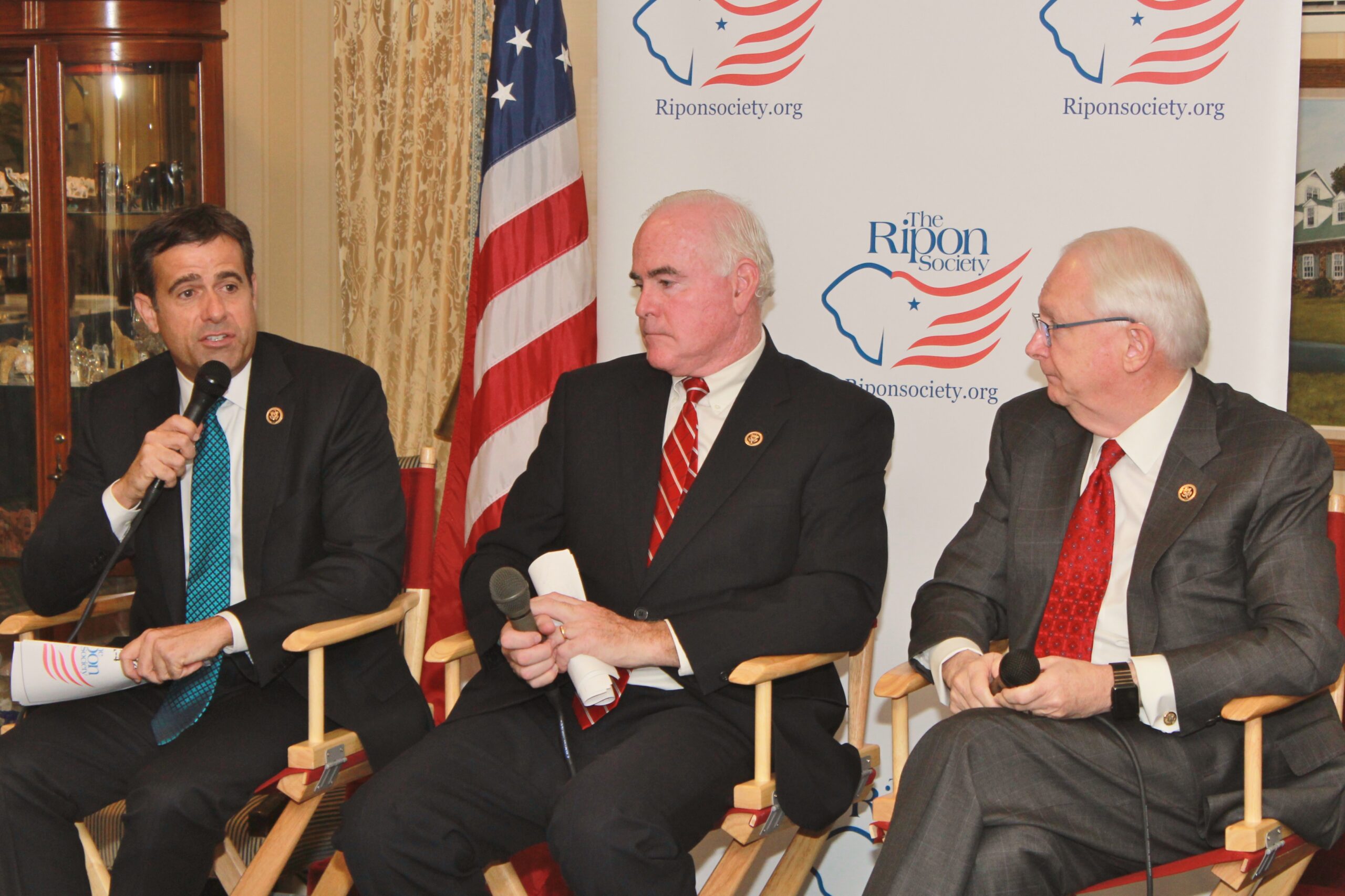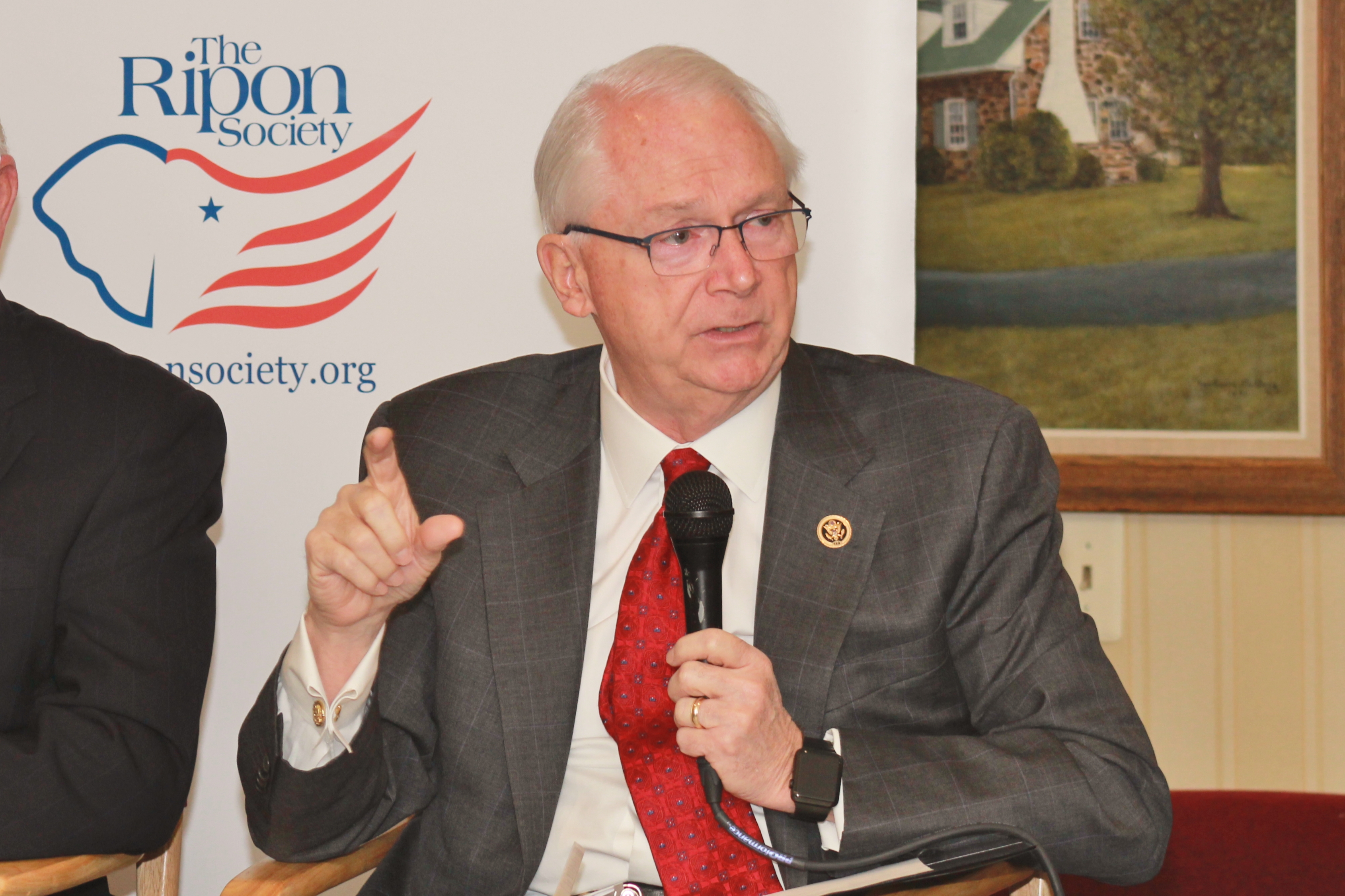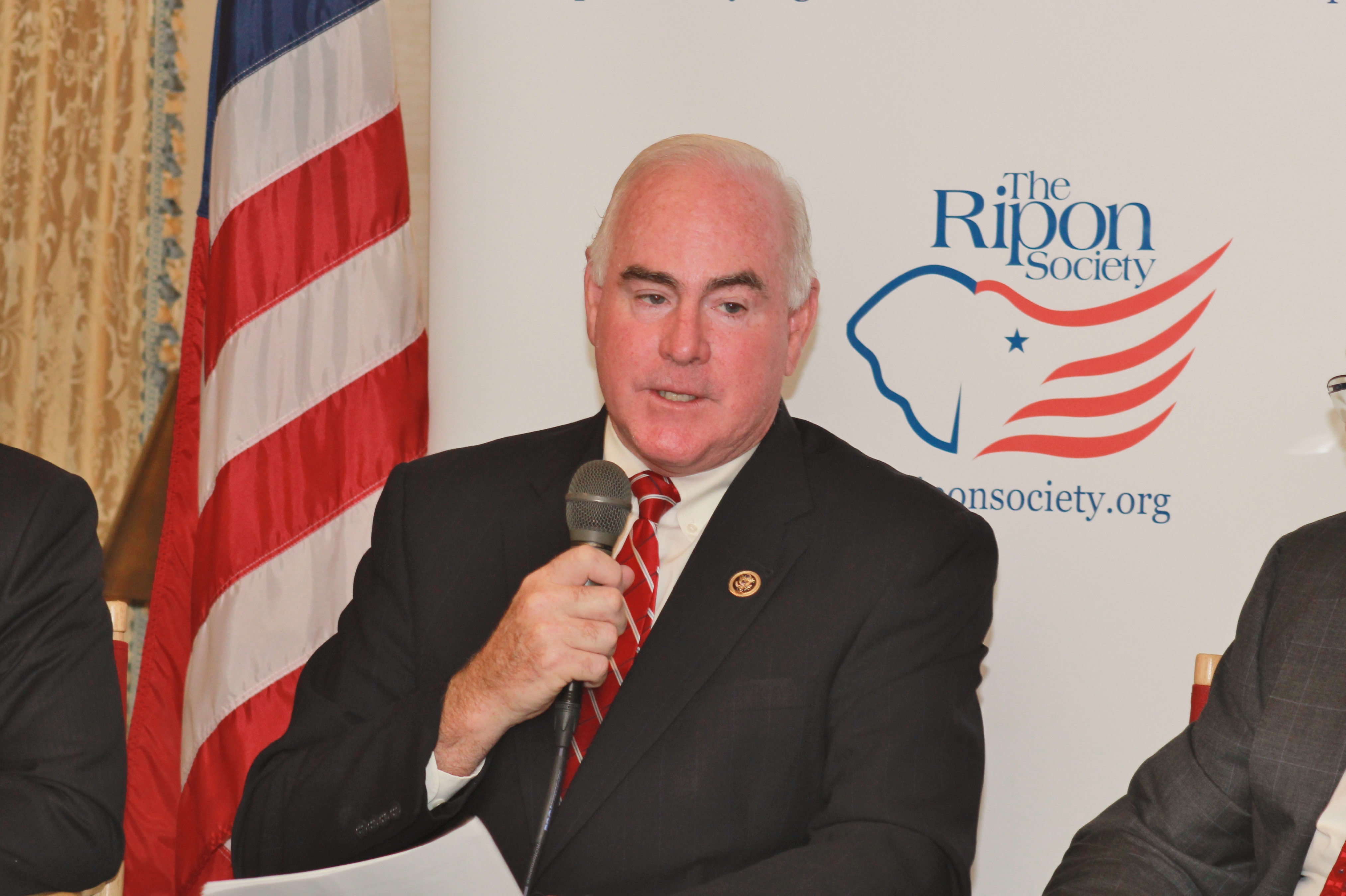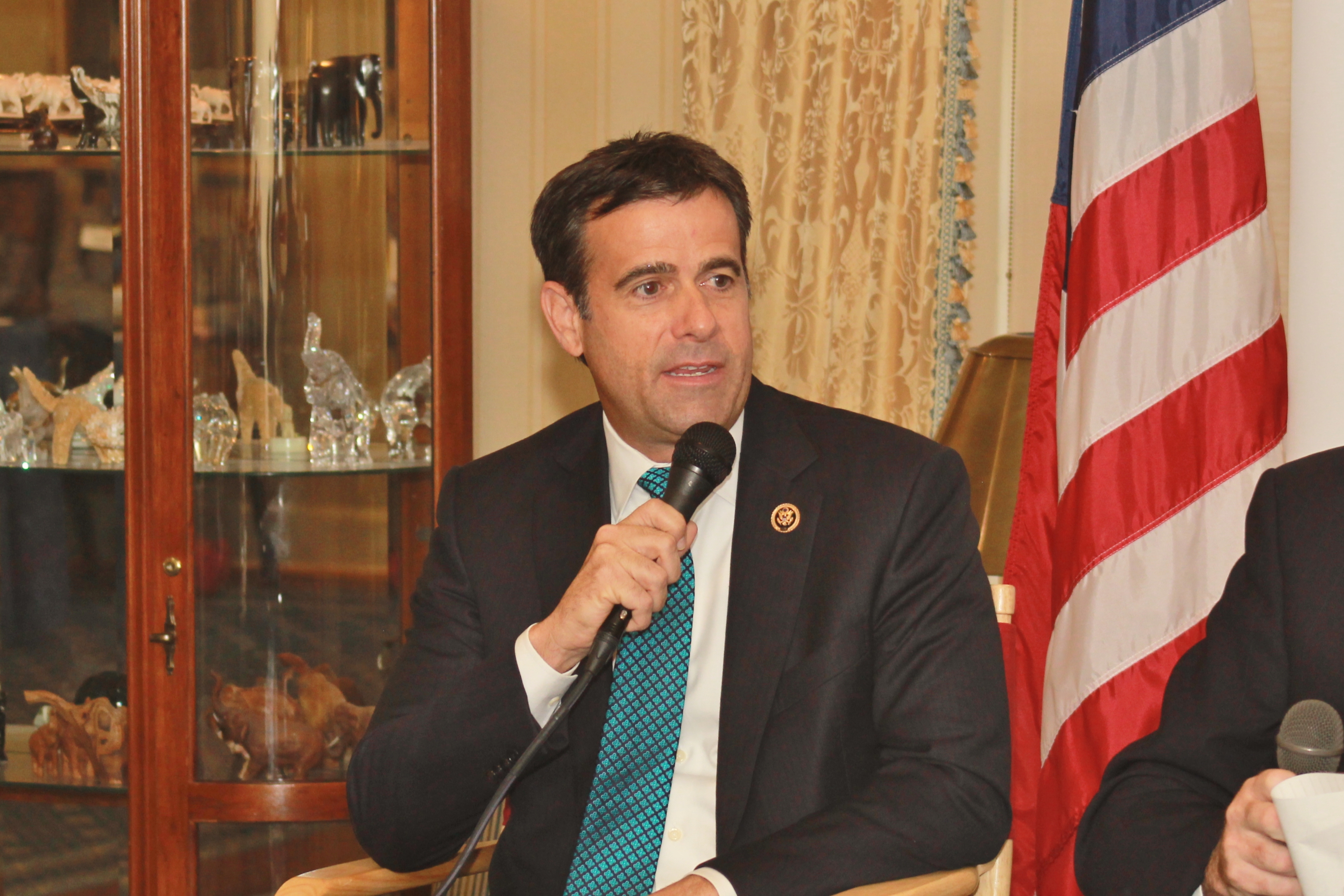 Neugebauer, Meehan & Ratcliffe Talk About Cybersecurity and the Effort They are Leading to Protect America in the Digital Age
Neugebauer, Meehan & Ratcliffe Talk About Cybersecurity and the Effort They are Leading to Protect America in the Digital Age
WASHINGTON, DC — With countries like Russia and China launching cyber attacks on a daily basis and reports that the CIA Director and Secretary of Homeland Security were hacked, The Ripon Society held a breakfast discussion yesterday morning that looked at the importance of protecting America in the digital age and featured three leaders in Congress who are working to achieve that goal.
The leaders included: Congressman John Ratcliffe (TX-4), who serves as Chairman of the Homeland Security Subcommittee on Cybersecurity, Infrastructure Protection & Security Technologies; Congressman Pat Meehan (PA-7), who Chaired the Cybersecurity Subcommittee prior to Ratcliffe before being appointed to a seat on the Ways & Means Committee late last year; and, Congressman Randy Neugebauer (TX-19), who serves as Chairman of the Financial Services Subcommittee on Financial Institutions & Consumer Credit and outlined the scope of the cyber challenge in his opening remarks.
“Cybersecurity is one of the most important issues facing our nation,” Neugebauer stated. “The whole world is interconnected. And as we see on a daily basis, people are utilizing it for productive purposes. We have a very robust economy that depends on the cyber world and cyber pipeline. But we also have people who are trying to do harm with it. The fact that it’s so interconnected makes it even more susceptible to attack, and makes the consequences of those attacks fairly major. You can imagine the disruption if someone were able to disrupt the financial services pipeline, even if for only a few minutes or a few hours, all those transactions – billions of transactions – that happen on a daily basis. All of our major infrastructure depends on having a safe and secure cyber world. Today, we’ll have about 117,000 attacks on the system. That will happen every day, and it will happen on a lot of different levels. It’s also one of the reasons that Congress has taken up this issue.”

Neugebauer has served as Chairman of the Financial Services Subcommittee since 2011. In this role, he has pushed for greater cyber protections in the financial services sector, and introduced, along with Democratic Congressman John Carney (DE-AL), bipartisan legislation earlier this year to protect consumers from identity theft and fraud. Called The Data Security Act of 2015, the bill would establish a national data security and breach notification standard for financial institutions and retailers to better protect consumer financial data. According to Neugebauer, the measure would achieve this goal not through federal mandates, but by making sure the federal government works with the private sector as an equal partner to keep consumer transactions secure.
“One of the things we don’t want to do in the payment space is get the government involved in dictating what technology we’re using,” the Texas lawmaker stated. “The technology is changing rapidly – it’s fascinating. And if you think about the federal government, it would take us five years to figure out what technology we agree on. By that time, there would be five new generations of technology. So what we’re trying to do is provide the standards to protect the data, and let the industry figure out the safest, fastest and most convenient way to provide for the payment space.”
Meehan echoed Neugebauer’s comments about the importance of the federal government working collaboratively with the private sector to keep cyber networks secure, and pointed to legislation that he shepherded through the House as Cyber Subcommittee Chairman in the last Congress that would do just that. He also expressed hope that an agreement will be signed into law by the end of next year, saying the need is urgent and the country cannot afford to wait any longer for Washington to act.
“All you have to do is pick up the newspaper,” Meehan stated. “Twenty one and a half million identities stolen at OPM is mind-boggling. But then you see that John Brennan, the head of the CIA, got hacked. It goes back to something that I’ve talked about in the past but we aren’t doing anywhere near enough of as a country – which is cyber hygiene. That’s a responsibility each and every one of us have. Understand the systems on which you are participating, and understand what you need to do to protect yourself. So cyber hygiene — no matter who you are — is something we all have to start paying more attention to.”

Meehan served as Cybersecurity Chairman in the 113th Congress. In his new role as a member of the Ways & Means Committee, he noted that some of the same issues related the protection of data and intellectual property have come up for debate during trade negotiations, and pointed to the pending trade agreements with Asia and Europe as areas where, for the first time, international “rules of the road” could be established and global cyber networks could be made more secure.
“It would be the first time you have a core group of 12 leading countries,” he observed, referring to the possible Trans-Pacific Partnership trade agreement, “where you’ve got an agreement on critical issues which are going to have an effect on international commerce. If you are able to get this through on the Asian trade agreement, it will be remarkably influential in terms of the European trade agreement, which may come on its heels. Put together, it would create a critical mass of countries around the world who would then begin to agree on some rules for the road. In the absence of those trade agreements, it goes back to the old status quo. In other words, there will continue to be bilateral agreements between a few countries.
“But what it also means is Russia and China – by virtue of their size and their influence – will begin to set some of the rules of the road, on everything from intellectual property rights to how data flows. And that will have remarkably difficult and important implications for American businesses. China’s ability to demand, for instance, that a software company turn over the keys to their encryption technology is very scary stuff. If we don’t have rules of the road and can’t leverage China in that way, we could see some sort of retrenchment in the ability of the internet to be a mechanism that works so efficiently. So there’s an awful lot at play, and an awful lot at stake with regard to the trade agreements.”
Ratcliffe agreed.
“Cybersecurity is national security,” he declared. “But the internet was built for opportunity, not for security. So now we have to retrofit all the laws and rules of the road. And the fact is, we’re playing catch-up when it comes to cybersecurity.” Referring to the Senate’s consideration of the cybersecurity bill that the House passed last year, he continued: “I’m expecting broad, bipartisan support for the Senate bill. This is important. In Washington, where it’s hard to find bipartisan support, cyber is an issue where I think there is an understanding on both sides of the aisle that we can’t afford not to get along.”

The Texas Republican, who served as a U.S. Attorney before his election to the House last year, noted that there is no “silver bullet” when it comes to keeping our cyber networks and critical infrastructure secure. Rather, Congress should focus on a series of steps aimed at achieving that goal. To that end, he added that he introduced a plan last month that would authorize the National Computer Forensics Institute to train state and local law enforcement officers, prosecutors, and judges on how to investigate cyber and electronic crimes, conduct computer and mobile device forensic examinations, and respond to network intrusion investigations.
“With all due respect to the President, who said that global climate change is the biggest threat to our national security,” Ratcliffe stated, “everyone in this room is threatened more by cyber intrusions and events than you are from what’s happening with global climate issues … As unfortunate as it is that the Secretary of Homeland Security and CIA Director have had their email accounts hacked, it underscores the point that everyone’s at risk. Everyone’s at risk. And we all need to be united on these issues and united on these fronts in terms of our national security.”
To view the complete remarks of Reps. Neugebauer, Meehan and Ratcliffe before The Ripon Society breakfast discussion yesterday morning, please click on the link below:
The Ripon Society is a public policy organization that was founded in 1962 and takes its name from the town where the Republican Party was born in 1854 – Ripon, Wisconsin. One of the main goals of The Ripon Society is to promote the ideas and principles that have made America great and contributed to the GOP’s success. These ideas include keeping our nation secure, keeping taxes low and having a federal government that is smaller, smarter and more accountable to the people.



